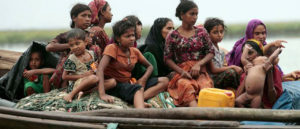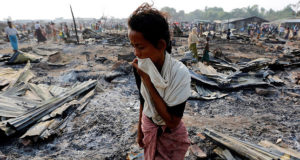Probe into Rohingya atrocities faces uphill battle
The UN’s Human Rights Council is preparing a probe into alleged atrocities against Myanmar’s Rohingya people despite the Yangon government indicating it will deny investigators access to areas where crimes against humanity may have occurred.
And while the resolution sponsored March by the European Union at the UN late last month called “ensuring full accountability for the perpetrators and justice for victims”, Myanmar has no obligation to cooperate with the fact-finding mission.
The Office of the High Commissioner for Human Rights says it is assembling an investigative team anyway.
Council president, Ambassador Joaquin Alexander Maza Martelli, of El Salvador, will appoint members of the mission and this is expected to be complete in the coming weeks, a spokesman for the Human Rights Council said.
 Meanwhile, letters to the Myanmar government are being prepared and a team of specialists – including experts in forensics and gender-based violence – will be assembled in Geneva to support the mission in establishing the facts and circumstances of alleged human rights violations by security forces in Rakhine State.
Meanwhile, letters to the Myanmar government are being prepared and a team of specialists – including experts in forensics and gender-based violence – will be assembled in Geneva to support the mission in establishing the facts and circumstances of alleged human rights violations by security forces in Rakhine State.
The resolution says the scope of the probe will include, but not be limited to, “arbitrary detention, torture and inhuman treatment, rape and other forms of sexual violence, extrajudicial, summary or arbitrary killings, enforced disappearance, forced displacement and unlawful destruction of property”.
“It is the hope of the Human Rights Council that the mission will be facilitated by the government of Myanmar through unfettered access to the affected areas,” the HRC spokesman said.
However, recently at the Human Rights Council in Geneva, Myanmar “disassociated” itself from the resolution to create a fact-finding mission.
Three days later, on Armed Forces Day, Myanmar’s military chief, Min Aung Hlaing, gave a speech rejecting “political interference” and claiming that the Rohingya are illegal immigrants from Bangladesh.
Myanmar’s civilian leader, Nobel laureate Aung San Suu Kyi, also rejected the UN decision, saying in a televised address: “It is not suitable for our country.”
But even if Aung San Suu Kyi agreed with the UN mission, there would be little she could do to facilitate it.
The elected, civilian administration she leads has a tenuous relationship with the military, which enforced absolute rule over Myanmar for almost half a century before enacting reforms in 2011.
The reforms allowed political freedom, but Aung San Suu Kyi has no power and limited influence over the military.
The Human Rights Council has no legal powers of enforcement and has no powers of censure to punish Myanmar if it fails to cooperate.
With the government and military expected to deny access, the UN mission is set to begin detailed investigations among the tens of thousands of Rohingya who fled across the border into Bangladesh after Myanmar’s military launched counter-insurgency operations late last year.
 Myanmar has consistently denied that atrocities took place during the counter-insurgency operations, but has prevented any outside scrutiny by sealing off the conflict zone in northern Rakhine State.
Myanmar has consistently denied that atrocities took place during the counter-insurgency operations, but has prevented any outside scrutiny by sealing off the conflict zone in northern Rakhine State.
Aid deliveries were also completely blocked for two months.
Human rights advocates had hoped the Human Rights Council would instead approve a more muscular Commission of Inquiry, which would have had a broader mandate and could have put greater pressure on Myanmar to accept it.
Myanmar’s two powerful neighbours, China and India, have both shown no interest in the resolution.
Indonesia has been outspoken about the crisis facing the Rohingya, but is unlikely to enter the debate, saying Myanmar’s government was acting “within the framework of upholding law as a sovereign country”.
European governments are insisting that Myanmar cooperate with the UN mission, but their language is hardly threatening – public statements stress the need to promote the country’s “democratic transition”.
Roland Kobia, EU ambassador to Myanmar, told IRIN the EU would “look forward to Myanmar’s full cooperation with the fact-finding mission” and “confirmation of the country’s cooperative approach with the international community”.
But there was no suggestion of any steps that might be taken to twist Aung San Suu Kyi’s arm or press the military into opening the door to the investigation team.
Laurie Nowell
AMES Australia Senior Journalist












